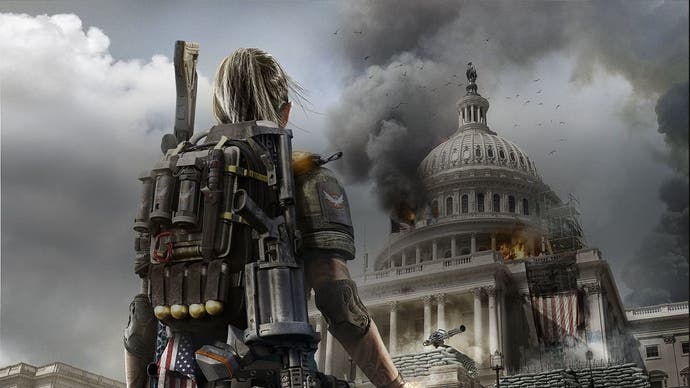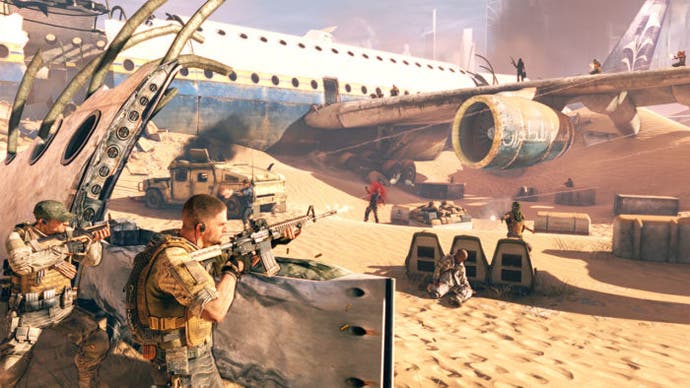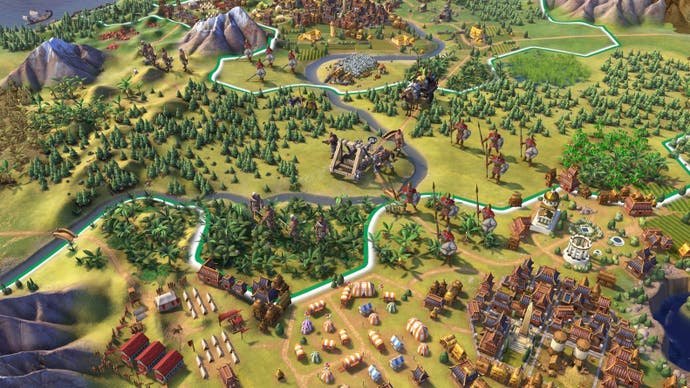Why we now talk about politics in games so much
AFK.
Politics in video games can be a contentious thing. That's no surprise, seeing as politics are contentious by nature. Many of us would much rather avoid them, and it's a sentiment that comes up when players feel their escape into a fantasy realm suddenly reminds them of a real-world issue. However, it's impossible to completely eradicate politics from our lives, even single aspects of it, and in the development of games as much as in talking about them, we've come to realise that.
I'd argue that this, however uncomfortable, is a good thing, even though it comes with a few caveats. Games now seem pretty intertwined with politics, but they always were. Often when we think politics, we think politicians - from discussions about game addiction, especially during the height of the WoW boom, to loot boxes and the sheer endless back-and-forth on the topic of whether or not shooters cause real-world violence, politicians have taken an interest in games whenever it became obvious that games are a large force in people's lives.
And that is also exactly what makes politics an important aspect of games; the general awareness that many of us play them, causing video games to grow to a billion dollar industry, and the fact that when people create stories, any kind of stories, they extrapolate from human experience. Politics as a term is multifaceted and applies to any construct that aids or governs how people live with each other. Games too, even if they're not about the French Revolution or shouting "Objection!" in a courtroom, are about the fundamental rights of and duties to people we want politics to achieve: we want to live together. What cultural products like games do is to look at why this is difficult, even if they often suggest that shooting someone in the face is a viable solution.

Games may have become more obviously political by choice and because we have changed, too. We're now more well-informed on politics on a global scale than we have ever been, and we're able to form an opinion on political discourse and recognise when a game is trying to mirror current events.
When politics feel like they are "shoehorned" into a game, it's likely because a present political talking point is immediately recognisable - many people have encountered variations of Donald Trump's election campaign catchphrase "Make America Great Again" in games, but it leads to nothing but people going "I understand that reference" and moving on. Heavy-handed mirroring that offers no comment on the issues that move us feels jarring.
I feel slightly different when it comes to the inclusion of women, people of colour and people on the LGTBQA spectrum. I've previously written about how as a person of colour, I would love to see more positive storylines that involve people of colour that don't centre on racism. There are still a lot of stories left untold, but as in society, the acknowledgement and integration of minorities to the point of normalisation takes a while.
Just as games use those at times heavy-handed political references because they want to point out our lived reality, the inclusion of minorities in games is a measure to reflect the world around us.
Games have reached a level of graphical and overall technical realism so high it's only natural to tell relevant stories with the virtual characters who look so much like us. That's a great thing - it's a way to chart not only how games have changed, but how the perception of games is changing, too: the people who play games make a larger percentage of the overall population than ever before. Gaming is part of the larger cultural fabric.
There are two answers to the question of why you should care at all about depicting anything remotely realistic in the virtua. One is that you already care. We care about fictional characters and their stories, and to pretend we care about them less in games is doing games at large - and ourselves - a disservice. We all have games that have had a profound impact on us, even if it's just through the memories we've made with them. Identifying with a character is to connect them with something real in our lives, even if it's just through a single sentiment.

But with great power comes great responsibility, so if we acknowledge the positive impact of games as well as their importance, we do at least have to have honest discussions about possible negative impact, as well. That isn't to say that you can't have shooters, and silly ones at that, no matter how often someone with little knowledge of the actual subject suggests games turn people into killers. But if you stuff a game - and here I'm going to go with that infamous Division 2 marketing campaign - with political references that are very easily discernible to an informed audience, you have to expect that someone asks you about them.
Sometimes the jovial tone in the industry doesn't fit the topic. I'm sure the killstreaks in the new COD: Modern Warfare are fun from a gameplay perspective, but sometimes I think the tone of announcements, like the addition of white phosphorous and the return of nukes, place particular scrutiny on games. In this regard my only solution is to raise awareness to why the inclusion of and gleeful tone at certain elements may raise eyebrows. If reporting within the games industry on these issues is responsible, I feel gamers may not be put in a defensive position of being called unaware or irresponsible, but obviously it's not a perfect solution.
I don't think everything is up for debate. I draw the line at harm to children, and slavery, acts we have established in real-life society as universally horrifying. These are political topics as much as careless handling of the potential for child gambling in FIFA is. Games and their relation politics are going to be part of an ongoing discussion. That's because politics, and thus the state of our lives are ever-changing.
The same way I ask after politics in a game I ask after everything else - why is this in there. Giving a reason opens you up to further examination - but showing awareness that certain elements in games are charged with political meaning is better than claiming to be truly neutral. No one is truly neutral, so if games continue to reflect real-world locations and social constructs, politics, political statements of intent and discussions thereof will be part of that.









